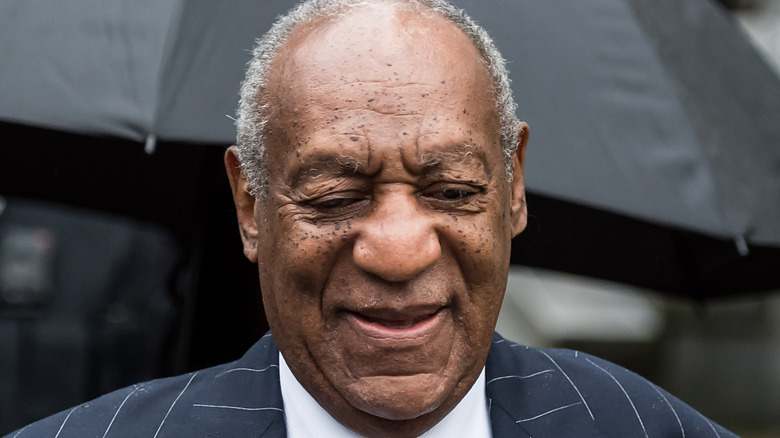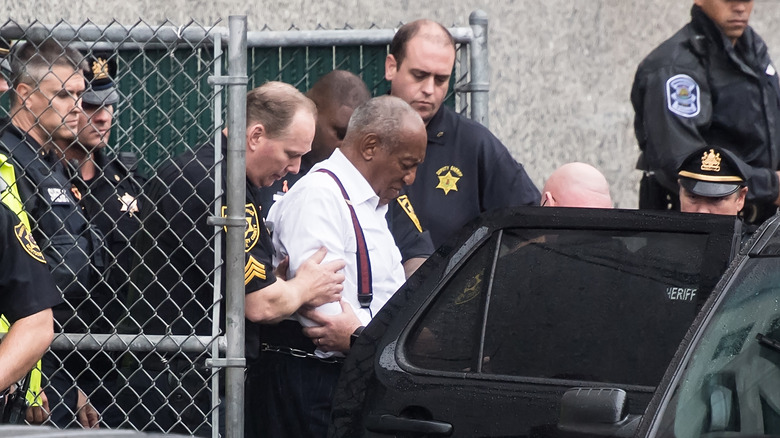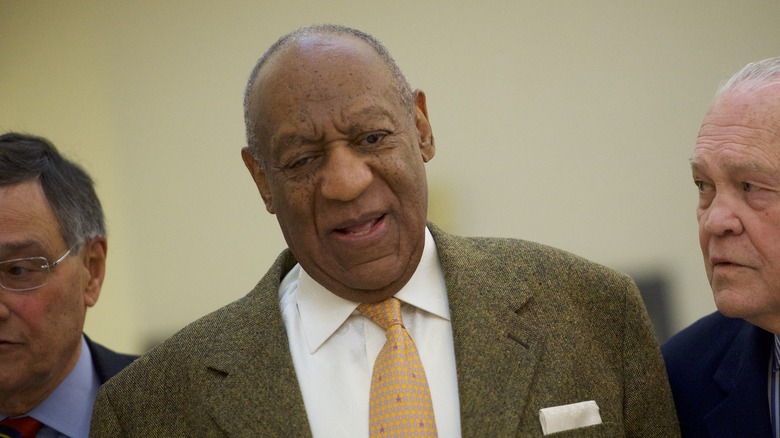What Bill Cosby's Life In Prison Was Really Like
American comedian Bill Cosby, born William Henry Cosby Jr. In 1937, was already well known as a stand-up comic and actor when he created and starred in the show that made him a household name (via Biography). In the 1980s, Cosby became known as "America's Dad" for his role as Cliff Huxtable in "The Cosby Show," which ran for eight years. After the show ended in 1992, Cosby was involved in many other TV projects, wrote several of books, and in 2013 he appeared in Comedy Central with a new special.
However, in 2014, allegations about Cosby's sexual misconduct surfaced — and not for the first time, per ABC News. Women started coming forward to talk about incidents that allegedly occurred for decades. The accusations went as far back as the mid-1960s when a former secretary at a talent agency claimed Cosby drugged and sexually molested her, ET Online reported. According to Biography, some of the women had been under 18 at the time.
Although more than 50 women came forward claiming they had been assaulted by Cosby, he was eventually convicted of three counts of aggravated indecent assault in April 2018 after a much-publicized trial. He was sentenced to three to ten years in state prison and a $25,000 fine, per the BBC.
Cosby was sent to prison immediately after the guilty verdict
Bill Cosby was first held at the Montgomery County Correctional Facility pending his guilty verdict. According to the Montgomery County Correctional Facility website, the prison is mostly used to hold offenders who are either in a pre-trial status or serving short sentences. The facility describes itself as "modern" and offers a number of services, including access to mental health services, learning centers, a library, a recreation center, and a therapeutic recreational program.
At the end of September, Cosby was moved to the SCI-Phoenix in suburban Philadelphia, a newly opened state prison that can house close to 4,000 inmates. According to NBC News, Cosby spent the first four months in a single cell in a special housing unit at the prison, out of concerns for his safety but also so he had time to acclimate to life in prison. He was eventually moved to the general population area in February 2019, where he also had his own single cell.
The general population area at SCI-Phoenix allows inmates to make use of the library or day room, as well as the gym or exercise yard throughout the day. Inmates in the general population also shared mealtimes (via The Toronto Star). The menu at the prison offers a choice of meat-based or vegetarian meals, and Cosby would have had a choice of things like roast pork with gravy, pizza, burgers, and even pancakes, as reported by The Philadelphia Enquirer and The New York Times.
Life in prison wasn't so bad for Cosby
While early tabloid reports seemed to imply Cosby was being bullied and harassed by other inmates, it turns out this might not have been the case. According to The Mercury News, Cosby was assigned "trustees" while in prison — prisoners who guide elderly or disabled inmates and help them get around. He also enjoyed a friendly and respectful relationship with the guards, who liked hearing about Cosby's TV days.
As a convicted sexual predator, Cosby was court-mandated to participate in a therapy program for sexually violent predators, but he refused to participate while incarcerated, calling the sessions "entrapment" (via ABC News). In May 2021, Reuters reported that a judge had denied Cosby's request for parole because of his refusal to participate in the therapy sessions.
While in prison, Cosby was eligible to call people and receive up to five visitors on visitation day, according to The New York Times. However, Cosby's children and wife, Camille, never visited him in prison, as he didn't want them to ever remember him in a prison uniform, per Los Angeles Times.
In a surprise turn of events, Cosby was released from prison at the end of June 2021, when a judge overturned his conviction. After his release, a spokesperson for Cosby told Fox News, "[Cosby] said, 'They treated me like a citizen, like a human being, and that's how everybody should be treated.'"


